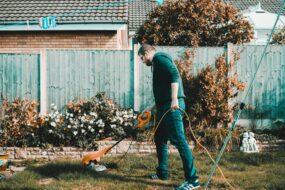
If you run a lawn care business, you already know how competitive the industry can be. With countless businesses offering similar services, the real challenge lies in standing out. But there’s good news! A solid search engine optimization (SEO) strategy can help you rank higher in search engine results pages (SERPs), bringing more customers to your lawn care business.
This blog will guide you through practical SEO strategies tailored specifically for lawn care professionals in the U.S. We’ll break down the importance of local SEO, keyword research, on-page and off-page optimization, and Google My Business. By the time you finish reading, you’ll have a clear roadmap to improve your online visibility and grow your customer base.
Why SEO Matters for Lawn Care Professionals
SEO is essential for lawn care businesses because most potential customers start their search for services online. According to reports, 78% of local mobile searches lead to offline purchases. This means that ranking higher in local search results directly translates to more business for you.
Unlike traditional marketing methods, SEO focuses on getting your website in front of people actively searching for lawn care services. Whether it’s “lawn mowing services near me” or “top lawn care companies,” you want your business to appear at the top of those search results.
The Basics of Local SEO
For lawn care professionals, local SEO is the foundation of your strategy. Local SEO ensures that your business appears in searches that include specific geographic terms, like city names or phrases like “near me.” Here are the top elements of local SEO:
1. Optimizing Google My Business (GMB)
Your Google My Business profile is your ticket to local visibility. When someone searches “lawn care services in Miami,” local packs (a list of businesses shown on Google Maps) are among the first results they’ll see. To optimize your GMB profile:
- Claim and verify: If you haven’t already, claim your business profile and verify it with Google.
- Provide accurate details: Include your business name, address, and phone number (NAP). Ensure this matches exactly with what’s listed on your website.
- Upload photos: Showcase your work with vivid photos of neatly mowed yards and satisfied customers.
- Encourage reviews: Customers’ reviews play a big role in local rankings. We’ll share tips for this later.
2. Adding Local Keywords
Include keywords with geographic terms on your website and GMB listing. Instead of using generic keywords like “best lawn care service,” try “top lawn mowing service in Chicago.” This helps Google connect your business to specific searchers in the area.
3. Building Local Citations
Citations are mentions of your business on other directories or websites, like Yelp or Angi (formerly Angie’s List). Focus on creating consistent listings that feature your NAP. This consistency boosts your credibility with search engines.
Keyword Research for Lawn Care Businesses
Identifying the right keywords is a game-changer for your SEO strategy. Keywords are the phrases people type into search engines when looking for services. Here’s how to find the best ones:
1. Use Dedicated Tools
Free tools like Google Keyword Planner or Ubersuggest give you data on keyword volume and competition. Look for phrases that strike the right balance—not too broad (high competition) and not too narrow (low search volume).
2. Focus on Service-Specific Keywords
Include terms that describe the services you provide, like:
- Lawn care services
- Lawn mowing near me
- Seasonal yard clean-up
- Weed control specialists
Pair these with geographic modifiers, such as “lawn care services in Atlanta” or “affordable lawn mowing Napa Valley.”
3. Target Long-Tail Keywords
Long-tail keywords are more specific, leading to higher conversion rates. For instance, “how much does lawn care cost in Raleigh” signals someone ready to make a decision. Long-tail phrases attract users with clear intent.
Improving On-Page SEO
Now that you’ve done your keyword research, it’s time to optimize your website. On-page SEO refers to elements you can control directly on your site.
1. Create Quality Content
Content is king in SEO. High-quality blog posts and service pages build trust and help you rank for target keywords. Examples of great content ideas include:
- “10 Lawn Care Tips for Homeowners in [City]”
- “The Best Grass Types for Yards in [Region]”
- FAQs about your services
Ensure that your content is easy to read (aim for a Flesch reading ease score above 60) and includes your target keywords naturally.
2. Use Meta Tags
Each page on your website should have optimized:
- Title Tags: Include your keyword and make the title compelling. For example, “Top Lawn Care Services in Phoenix | Free Estimates.”
- Meta Descriptions: Keep it under 155 characters and highlight the value you offer. Example: “Affordable lawn mowing and maintenance services for Phoenix homeowners. Call today for reliable care!”
3. Image Optimization
Use descriptive file names and alt text for images. For example, instead of “IMG1234.jpg,” rename files to something like “freshly-mowed-lawn-Dallas.jpg.” Alt text like “A freshly mowed lawn in Dallas, TX” ensures search engines know what the image depicts.
4. Optimize for Mobile
More than 50% of website visits now come from mobile devices. Make sure your site looks great and functions well on phones and tablets. Fast load times, a responsive design, and clickable buttons are non-negotiable.
Off-Page SEO Strategies
While on-page SEO focuses on your website, off-page SEO involves activities outside your site that boost your credibility.
1. Earn Backlinks
Backlinks are links from other websites to yours. They signal to Google that your site is trustworthy and authoritative. You can earn these by:
- Partnering with local bloggers or landscapers for guest posts.
- Sharing your content on social media to encourage others to share it too.
- Participating in community events and writing press releases about your involvement.
2. Social Media Engagement
Platforms like Facebook and Instagram don’t directly impact technical SEO, but they do strengthen your online presence. Share lawn care tips, promotions, and photos of your completed projects. The more people engage with your content, the more likely they are to visit your website.
Customer Reviews and Reputation Management
Customer reviews have a massive impact on local SEO. The more positive reviews you have, the more likely Google is to rank you higher.
- Ask for reviews: Send follow-up emails or hand out cards politely asking satisfied customers to leave a review on your GMB profile.
- Respond to reviews: Whether positive or negative, respond promptly and professionally. Thank customers for positive feedback, and handle complaints gracefully to show you value their concerns.
How SEO Dreamers Can Help
SEO can be time-consuming, especially when you’re busy perfecting your craft outdoors. That’s where SEO Dreamers steps in. We specialize in crafting tailored SEO strategies for lawn care professionals. From optimizing your website and GMB profile to building high-authority backlinks and creating engaging content, we’ve got you covered.
Get Started Today
Elevate your lawn care business by investing in SEO. A higher ranking in search results means more customers and greater profitability. Don’t take chances with amateurs; partner with experts who know your industry.
Contact SEO Dreamers today to start your journey toward online success. We’ll help you plant the seeds for growth and ensure your lawn care business stays ahead of the competition!











No Comments